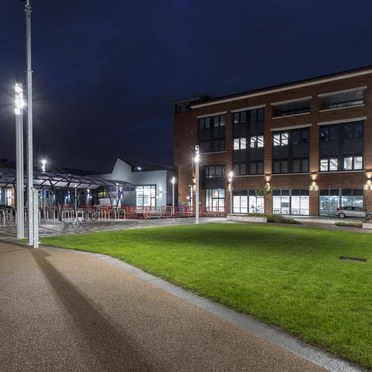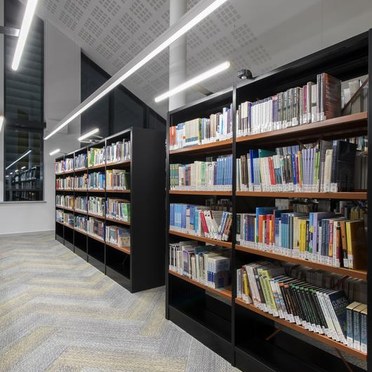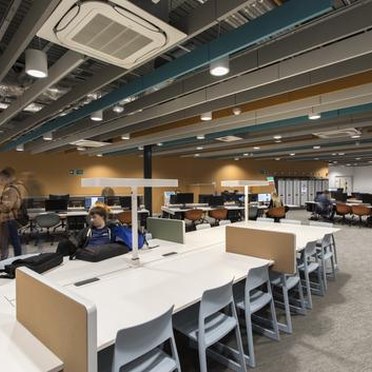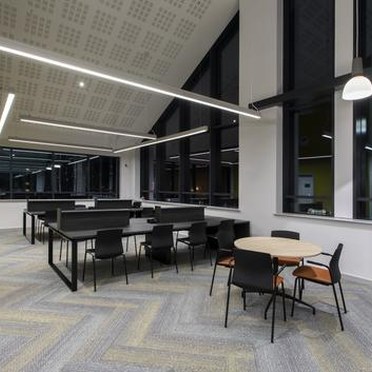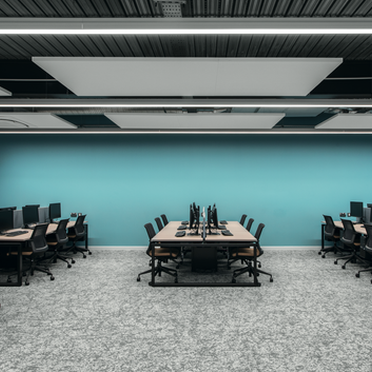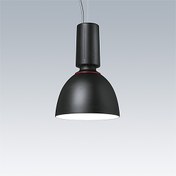Highly efficient lighting for University of Wales
Products
- Lamp efficacy
Lamp efficacy
Ensuring the lamp efficiently converts electricity into light (lm/W).
- Ballast classification
Ballast classification
Controlling the electricity supply to the lamp (Energy Efficiency Index).
- Luminaire distribution
Luminaire distribution
Controlling light emission using optics which bend and shape the light to the correct location.
- System efficacy
System efficacy
Combining optical and thermal control within the luminaire (luminaire lm/W).
- Presence/absence detection
Presence/absence detection
Presence: Lights automatically turn on/off with movement. Absence: Lights automatically turn off and must be manually switched on.
- Daylight detection
Daylight detection
Artificial lighting which responds to the natural light conditions.
- Constant illuminance
Constant illuminance
A function designed to produce correct light levels for the duration of the maintenance period.
- Task-scene setting
Task-scene setting
Allowing the user to set scenes and adapt the lighting to different tasks.
- Timed off
Timed off
Automatic cut-off can be installed to turn all lights off during unoccupied hours.
- Task lighting
Task lighting
Lighting task areas with the correct amount of light.
- Zoning of lighting
Zoning of lighting
Lighting is zoned according to area use.
- Maintenance schedule
Maintenance schedule
Maintenance must be performed in response to product age, performance and environment.
- Waste light
Waste light
Eliminating waste light which does not hit the intended target.
- Reflectance
Reflectance
Taking advantage of light which is reflected from the surface within the space.
- Visible smart metering
Visible smart metering
Results of actions can be quickly seen as increased or decreased energy use to encourage responsible energy consumption.
Thorn Lighting and Zumtobel Lighting have created a solution for the state-of-the-art University of Wales Trinity Saint David development as part of the new SA1 Swansea Waterfront Development. The client’s brief called for modern and highly efficient lighting with high performance and excellent aesthetics both internally and externally, in order to promote the building as a sustainable higher education facility and a perfect environment for learning.
The possibility to choose the best solutions from multiple brands
all from one hand – for indoor and outdoor.
Thorn and Zumtobel were chosen for the project for their ability to supply ‘fit for purpose’ luminaires for every area of the building that would achieve all of the requirements for the project. Zumtobel’s SLOTLIGHT was incorporated into the design for classrooms and the library to provide an aesthetic, efficient, consistent, uniformly illuminated line. For University of Wales Trinity Saint David, a single run of SLOTLIGHT INFINITY has been installed to provide a virtually infinite light line without interruption or dark spots, high precision and uniform illumination. Using prefabricated frames and spacers ensures a uniform appearance, resulting in a high-grade lighting solution meticulously integrated into the interior design, which appears as a consistent light line.
Thorn’s Chalice Surface has been chosen for the corridors and breakout spaces for its high efficacy of 106lm/W and resulting low energy consumption. Chalice has an overall height of less than 100mm making it ideal for low ceiling depth. Omega LED has also been utilised in the breakout areas for good uniformity and adjustable mounting options for through-life flexibility. For the Atrium Glacier, a modern and efficient decorative LED pendant luminaire, has been installed to provide a high performance (91-124lm/W), efficient solution that suits the surrounding décor. To compliment Glacier, Zumtobel’s ONDARIA, round wide-area luminaire with sound absorption has also been used. The elegant ONDARIA is optimised to meet the demands of contemporary spaces that have an ‘open’ look and feel, offering an homogeneous light surface and excellent sound absorption.
The IP65 rated Alumet Stage from Thorn has been used to illuminate the exterior of the building to provide exceptional visual comfort during the night and decorative urban furniture during the day. This stylish column features a cylindrical diffuser containing up to six light modules with output reaching 6,600 lm and an impressive efficacy of 80 lm/W. Alumet Stage is capable of illuminating both horizontal and vertical surfaces, delivering maximum flexibility.
Zumtobel’s LITENET lighting management system is being used in conjunction with a 360° Skyscanner on the roof of the building to deliver optimised visual comfort and energy efficiency. The Skyscanner sends environmental information to the LITENET software enabling the setting of specifically designed brightness scenes by room or area to create defined atmospheres based on the purpose of that space. Central to the concept is the ability to allow daylight to form a fundamental part of the lighting strategy and be supplemented with exactly the right amount of artificial light to create the perfect environments needed for learning, communicating and growth.
The result of integrating efficient, attractive luminaires along with cutting edge lighting controls is a building which allows its architectural merit to shine hand in hand with exceeding the energy efficiency needed in a modern development.

